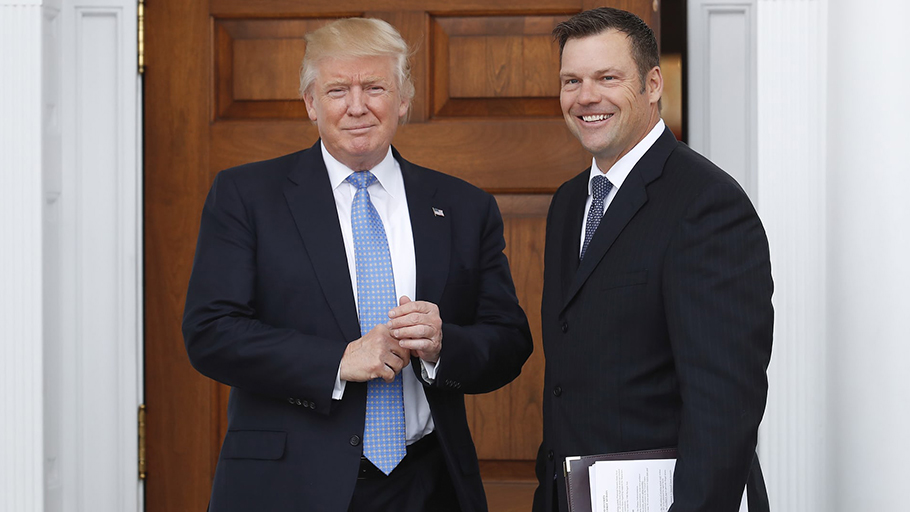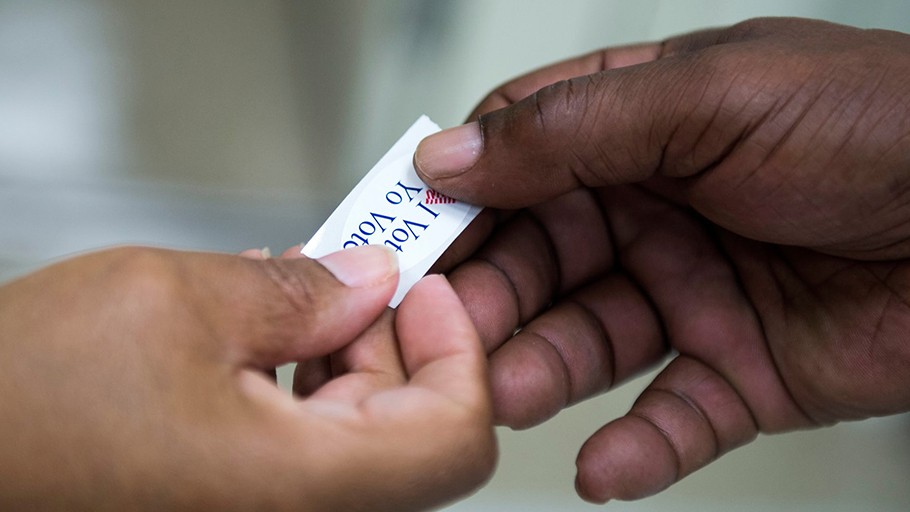‘There’s another important public space where blackness has been policed: the voting booth.’ Photograph: Shawn Thew/EPA
The routine suppression of black voters is far-reaching and has devastating consequences. We cannot be silent about it.
By Carol Anderson, The Guardian —
The recent spate of whites calling 911 on African Americans for barbecuing while black, waiting in Starbucks while black, sleeping at Yale while black ad nauseum has led to a much-needed discussion about the policing of public spaces.
Yet, there’s another important public space where blackness has been policed and we have been far too silent about it: the voting booth. And the implications are just as far-reaching and devastating, and, despite Chief Justice John Roberts’ claim, not some relic of a bygone past.
The 21st century is, in fact, littered with the bodies of black votes. In the 2000 presidential election, which George W Bush won in the sunshine state by 537 ballots, Florida kept African Americans from the polls or ensured that their votes would never be added to the state’s tally. The policing was multi-tentacled. On election day, there were faulty voting machines, purged voter rolls (purges that targeted minorities) and locked gates at polling places that should have been opened. There was also a Florida Highway Patrol checkpoint at the only road leading to the polls in key, heavily black precincts in Jacksonville. Then there were the piles of ballots, especially in counties with large minority populations, left uncounted. The US Civil Rights Commission“concluded that, of the 179,855 ballots invalidated by Florida officials, 53% were cast by black voters. In Florida,” the commission’s report continued, “a black citizen was 10 times as likely to have a vote rejected as a white voter.”
That targeting of African Americans was just as egregious in North Carolina after the US supreme court gutted the necessary protection of the Voting Rights Act in 2013. The catalyst for North Carolina’s assault was simple: black people had dared access their 15th amendment rights. Since 2000, African American voter registration had increased by 51.1% in the state, and blacks also had a higher voter turnout “rate than white registered voters in both the 2008 and 2012 presidential elections”.
Effective black access to that public space, the voting booth, triggered, as the federal court noted, a targeting of African American voters “with almost surgical precision”. The state required ID’s which its research showed a disproportionate number of black people did not have. And, as Think Progress reported, the GOP slashed the number of early voting sites in Guilford county, which is nearly 30% African American, from “16 in 2012 to a single location” in 2016. As a result, the magazine noted, “turnout so far is down 85%”. There was a similar elimination of early voting sites in Mecklenburg county, home to the city of Charlotte and 15% of the state’s African American population. Pleased with what they had accomplished, North Carolina Republicans “celebrated” mowing down black access to the voting booth.

Donald Trump and Kris Kobach’s talk of voter fraud ‘is the lie used to justify voter suppression techniques’. Photograph: Carolyn Kaster/AP
In Indiana, once it became clear that black people could determine the outcome of an election, like when Barack Obama carried the state in 2008, the Republicans mobilized to cut off African Americans’ access to the polls. Similar to North Carolina, Indiana’s GOP realized how essential early voting was to black voter turnout. The Republican-dominated legislature mandated that counties with more than 325,000 residents could only have one early voting location unless approved on a bi-partisan basis. The governor, Mike Pence, signed this into law in 2013. Once again, the targeting was clear. Only three counties in Indiana have more than 325,000 people and account for 72% of the state’s black population. The result, as the Indianapolis Star reported, is that Marion county, including the state’s largest city, Indianapolis, lost two of its sites and was reduced to only one early voting precinct, which was inaccessibly located downtown with no available parking. Not surprisingly, by design, in the 2016 election, early voting in the county plummeted by 26%.
Georgia is also adept at policing black citizens who dare to vote. In 2010, when African Americans in Brooks county organized a massive voter turnout drive and elected the first majority-black school board in its history, the secretary of state, Brian Kemp, had a dozen African American activists and school board members arrested and, over the course of a long grueling four-year period, dragged through the courts. Although, in the end, there were zero convictions for voter fraud, there was a chilling effect as lives were ruined, jobs lost, and a hard lesson on the costs of voting made abundantly clear.
Then, in 2014, Kemp put his crosshairs on the New Georgia Voter Project, an organization determined to register some of the 700,000 African Americans in the state who were not yet on the voter rolls. When the group signed up more than 100,000 to vote, Kemp immediately took to the airwaves insisting: “We’re just not going to put up with fraud.” That claim, spoken often and wrongly by Republican stalwarts from Kris Kobach to Donald Trump, is the lie used to justify voter suppression techniques. Yet, as the law professor Justin Levitt has documented, between 2000 and 2014, there have only been 31 cases of voter identification fraud out of one billion votes. Kemp, in his own way, acknowledged the lie when, behind closed doors, he explained to a group of fellow Republicans: “Democrats are working hard … registering all these minority voters … If they can do that, they can win these elections in November.” He, therefore, used the power of his office to launch a very public multi-year investigation that would, once again, aim to intimidate and dissuade African Americans from registering to vote.
In 2016, pummeled by voter suppression in more than 30 states, the black voter turnout plummeted by 7%. For the GOP, that was an effective kill rate. For America, it was a lethal assault on democracy.
Carol Anderson is the Charles Howard Candler professor of African American studies at Emory University. She is the author of White Rage: The Unspoken Truth of Our Racial Divide and the forthcoming, One Person, No Vote: How Voter Suppression is Destroying Our Democracy.















